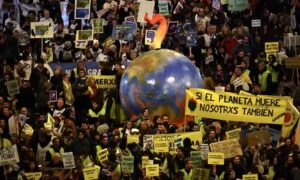This Guest Article for REVITALIZATION was written by Aliza Ayaz.
As the UK moves towards a return to restriction-free life, our attention should be shifting towards addressing the other global crisis: the climate emergency.
According to the UN Secretary-General, 2021 is the “make or break” year to act; the post-pandemic recovery must therefore be both sustainable and equitable.
The devastating impacts of the novel coronavirus and its variants have highlighted societal disparities in the UK and beyond.

Photo courtesy of The Guardian.
If we are to truly learn lessons from this global health tragedy we must pre-empt and start working to prevent unequal “green” outcomes, pursuing this with the same urgency as tackling unequal health outcomes.
We cannot have a sustainable society without all communities benefiting from, and implementing, sustainable practices.
In the UK, we have reduced carbon emissions by 51% (from 1990 levels) with little noticeable effect on the way we live our lives.
However, it is estimated that about 60% of the action needed to reach net-zero will require at least some consumer behavior change.
How can we ensure this behavior change is achieved? And how can we make that burden fair across society?
We need to support communities and industries that will see dramatic change as “greener” policies are introduced, for instance. This involves safeguarding jobs and future-proofing opportunities for the next generation.
Education campaigns and incentivizing more sustainable options for consumers should also be explored as the public need accurate, trustworthy information, and in some cases will need to see a financial benefit, to choose the product or service that is better for the planet, rather than more convenient.
One way we can plan, develop, and implement such policies is to create a long-term leadership coalition that has oversight on delivering the UK’s Net Zero ambition (an idea initially put forward by Cambridge Zero).
In the recent report “Build better: What can be learned from the COVID-19 pandemic to construct a resilient, innovative and prosperous future for all” published by the British Science Association’s For Thought program, it is suggested this should be a coalition of leaders from business, policy, science and research, and civil society.
A key part of this should be the consultation of citizens on policy decisions using opinion data in combination with participatory approaches and public deliberations such as the Climate Assembly model. This is particularly important in communities and industries most affected by the climate crisis and the transition to low-carbon.
In my role as UN Youth Ambassador for the SDGs I work to localize the targets; something that is crucial to the overall success of sustainability programs.
Communities and people need to be at the heart of any new environmental policies implemented, and a leadership coalition with inclusive representation creates a system where voices across society can be heard.
Inequalities have left people behind during one of the worst crises seen in our lifetime; we must do our utmost to avoid a repeat of mistakes in public health in our attempts to restore the planet.
Photo of author courtesy of the author.
About the Author:
 Aliza Ayaz is the world’s youngest United Nations Goodwill Ambassador.
Aliza Ayaz is the world’s youngest United Nations Goodwill Ambassador.
Ayaz is completing a Masters in Infectious Disease Epidemiology at University College London and the London School of Hygiene and Tropical Medicine.
She is the Founder and Chair of UCL’s Climate Action society.

